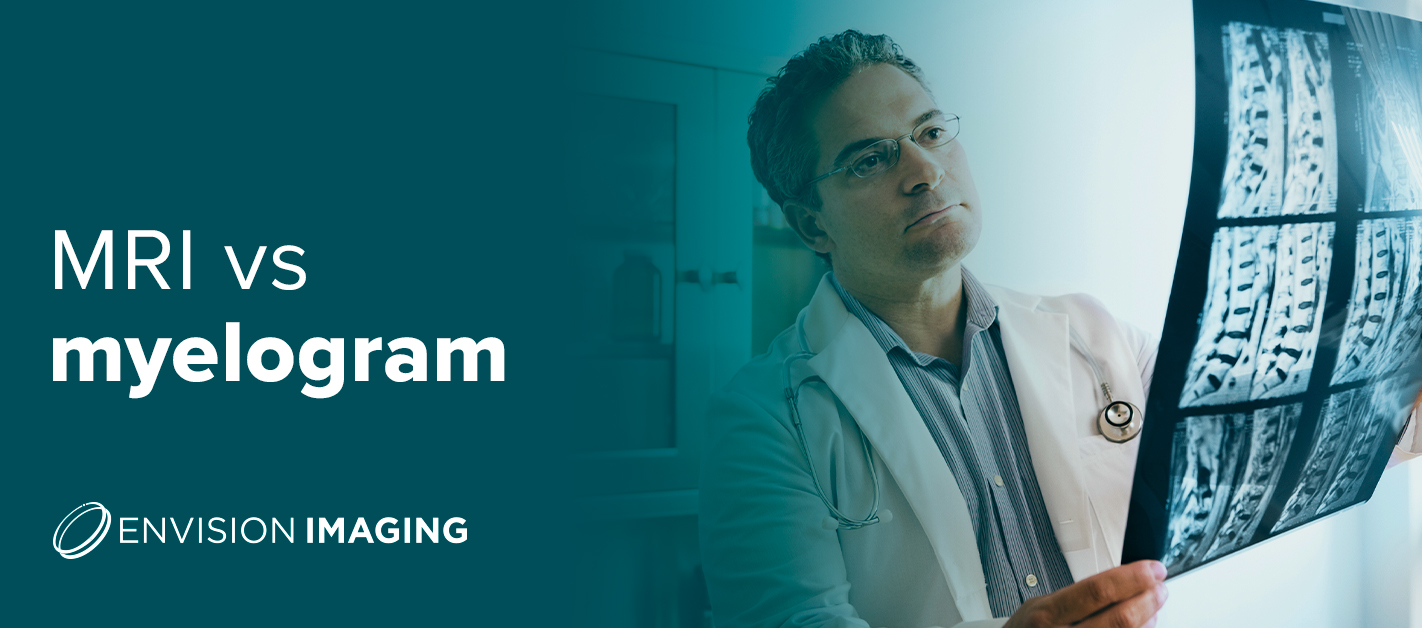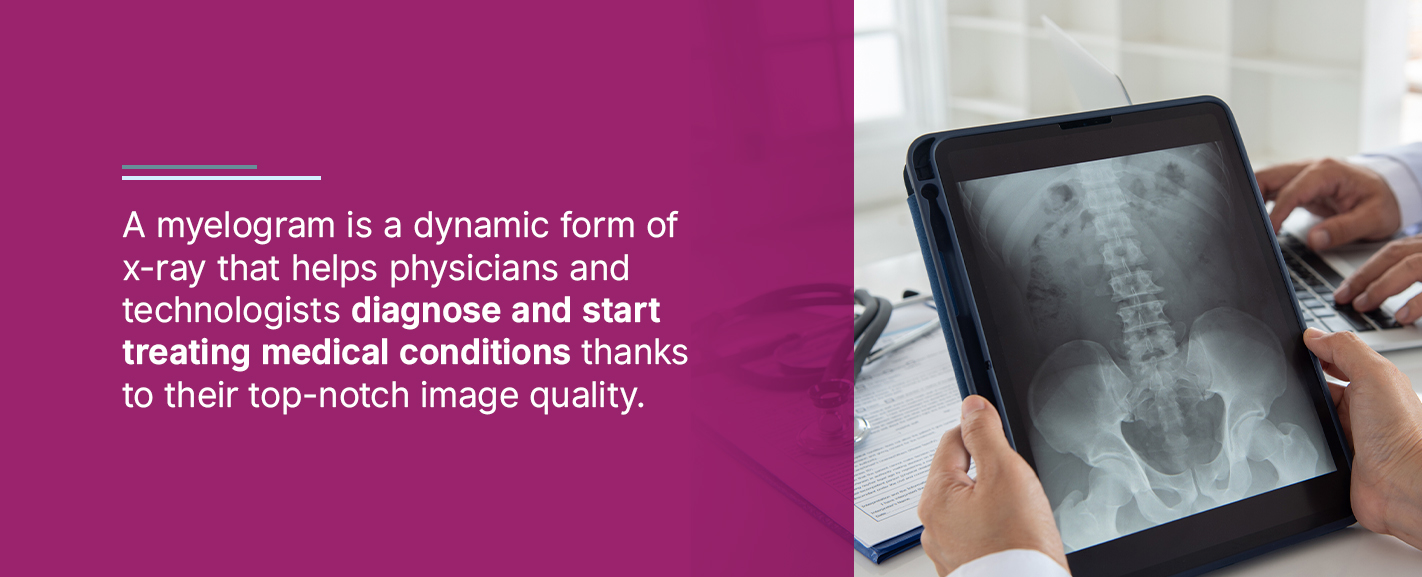MRI vs. Myelogram
 In the world of spinal imaging, there are many forms of procedures and imaging available for radiologists, or doctors who specialize in x-ray, to diagnose diseases. Each procedure acts as a tool a radiologist can select at any time to complete a specific task. In this article, we’ll examine two spinal imaging tools that have similar functions but are different in application, purpose and safety — the MRI and myelogram.
In the world of spinal imaging, there are many forms of procedures and imaging available for radiologists, or doctors who specialize in x-ray, to diagnose diseases. Each procedure acts as a tool a radiologist can select at any time to complete a specific task. In this article, we’ll examine two spinal imaging tools that have similar functions but are different in application, purpose and safety — the MRI and myelogram.
What Is an MRI?
MRI, or magnetic resonance imaging, is a widespread imaging technique most often used to examine and diagnose medical conditions for internal aspects of the body. MRIs use a strong magnetic field produced by electric currents and radio waves to map the location of water and fat in different body tissues, creating a clear and precise image of the inside of the body. These images turn out to be so accurate because bodies consist of about 65% water, meaning there are many reference points the MRI machine can use to create the image — and many diseases become noticeable through an increase in water content. The MRI machine then maps out the images on a computer screen for the radiologist to examine and possibly make a diagnosis from the results.When Do Radiologists Use MRIs?
An MRI can examine your brain, heart, bones, joints and blood vessels, along with numerous other aspects of the body. There are many reasons a radiologist may order an MRI for you. Most of the time, an MRI of the spine is required to examine or pinpoint an issue in or around the spinal cord. These ailments include, but are not limited to, the following:- Anatomy and alignment
- Joint or disc disease
- Congenital disabilities within the vertebrae or spinal cord
- Spinal cord and nerve compression or inflammation
- Infection or tumors in the spinal cord, vertebrae, discs, nerves or surrounding soft tissues
- Compression fractures
- Bone swelling
Risks Associated With MRIs
Overall, an MRI poses very minimal risk as long as all the proper safety precautions and guidelines are taken and followed. These risks include:- Sedation: Some MRIs require the sedation of the patient for the exam. This potential risk isn’t unique to MRIs — any time you take anesthesia, you’re at risk. Luckily, your radiologist and the rest of the medical team can minimize that risk by monitoring your vitals throughout the exam.
- Magnetic field: The strong magnetic field itself isn’t harmful, but it can impact any medical devices inside the body, possibly causing them to malfunction.
What Is a Myelogram?
 The least common of the two procedures is called a myelogram. A myelogram is a dynamic form of x-ray that helps physicians and technologists diagnose and start treating medical conditions thanks to their top-notch image quality. These procedures use an injection of contrast material — a safe and water-soluble dye specifically designed for the procedure — to assess the state of the spine and surrounding areas.
A radiologist will inject the contrast material into the lower portion of the spinal canal, typically because it’s safer and more accessible for them. Then, they can monitor the real-time flow or movement of the material to see if there are any abnormalities. A myelogram is typically paired with or followed by a computerized tomography (CT) scan to get an even better look at any problems that may be present.
The least common of the two procedures is called a myelogram. A myelogram is a dynamic form of x-ray that helps physicians and technologists diagnose and start treating medical conditions thanks to their top-notch image quality. These procedures use an injection of contrast material — a safe and water-soluble dye specifically designed for the procedure — to assess the state of the spine and surrounding areas.
A radiologist will inject the contrast material into the lower portion of the spinal canal, typically because it’s safer and more accessible for them. Then, they can monitor the real-time flow or movement of the material to see if there are any abnormalities. A myelogram is typically paired with or followed by a computerized tomography (CT) scan to get an even better look at any problems that may be present.
When Do Radiologists Use Myelograms?
Before introducing MRIs, doctors used myelograms in capacities similar to how we use spinal MRIs today. Although MRIs have made myelograms relatively obsolete, there are still some scenarios in which a physician will request a myelogram as an alternative to an MRI.- The patient can’t have an MRI: There’s an abundance of reasons a specific patient may not be eligible for an MRI, but the most common reason is for the patient’s safety. Suppose a patient has a pacemaker or other metal device inside of their body. In that case, radiologists typically order a myelogram as an alternative to the giant magnet known as an MRI machine.
- Myelograms can outperform MRIs: In addition to the fact that MRIs aren’t safe for some people, myelograms can perform better than MRIs in analyzing some areas of the body. These areas include nerve root compression evaluation, capturing the width of the spinal canal and the foramina, cervical root avulsion imaging, coronal and mobile coronal views and identifying ventral and dorsal rootlets.
Risks Associated With Myelograms
Because it’s an older and less technically advanced technique, myelograms may involve a few more risks. While rare, there are still reasons why some people should not receive a myelogram, so you should be aware of these risks before the procedure:- Radiation exposure: A myelogram is a form of x-ray, so it does slightly expose you to radiation, which could potentially lead to cancer in extreme cases. In a more realistic scenario, women who are or may be pregnant should avoid a myelogram more times than not to protect their child’s health.
- Allergic reaction: Some patients may experience an allergic reaction to the contrast material, so it’s essential to double-check that you’re not allergic to the substance before you have a myelogram.
Get Your Spinal Imaging Done at Envision
 Do you need an MRI, myelogram or other type of medical imaging? At Envision Imaging, we offer a wide variety of imaging services like MRIs, CT scans, x-rays and myelograms at an affordable price with compassionate care. Before, during and after your procedure, our team of experienced technologists will treat you like family and work to ensure everything is completed the right way.
Do you need an MRI, myelogram or other type of medical imaging? At Envision Imaging, we offer a wide variety of imaging services like MRIs, CT scans, x-rays and myelograms at an affordable price with compassionate care. Before, during and after your procedure, our team of experienced technologists will treat you like family and work to ensure everything is completed the right way.
Call To Schedule Your Appointment
Explore our website today to learn more about Envision Imaging and our services. Browse our locations to request your next diagnostic imaging appointment. Our world-class facilities, compassionate care and accurate results ensure a pleasant and reliable experience.Links
https://www.envrad.com/services/mri-scans/
https://www.envrad.com/services/ct-scans/
https://www.envrad.com/services/x-ray/
https://www.envrad.com/services/myelogram/


